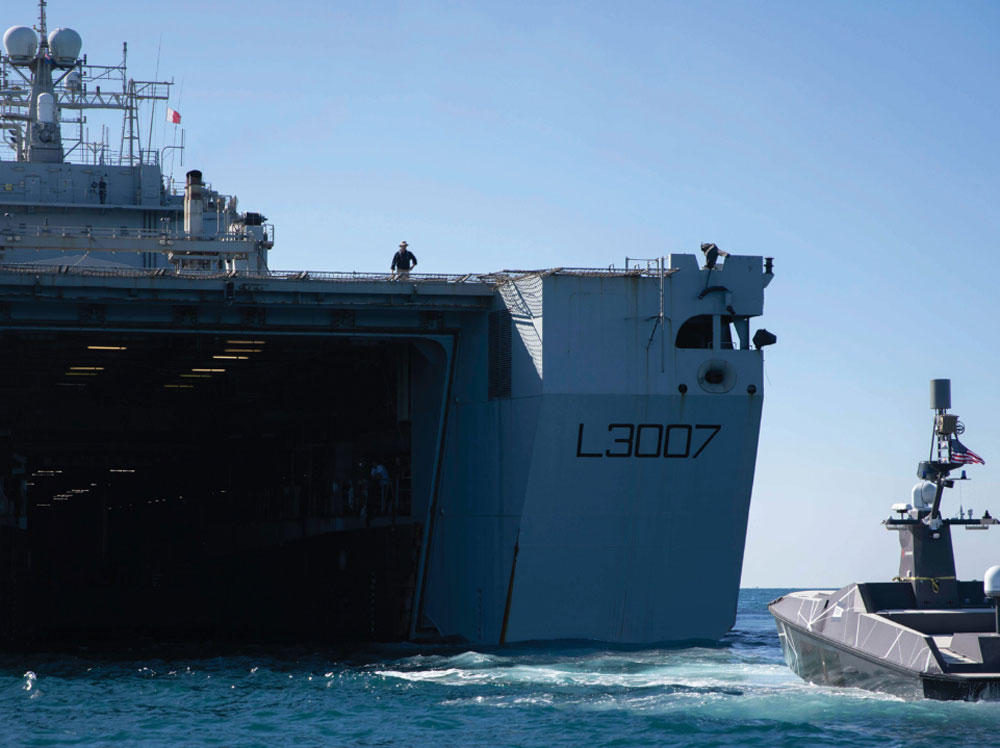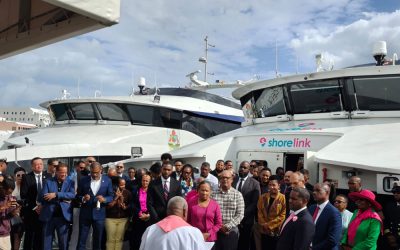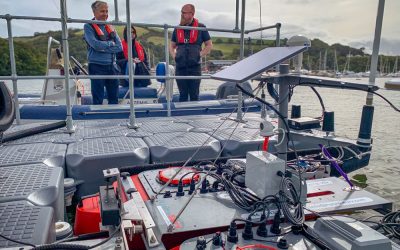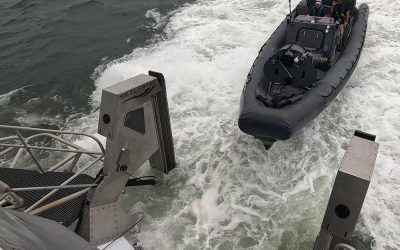From a US$3.5 billion push to become the world’s fully AI-native city by 2027, to this year’s roll-out of a fleet of self-driving robotaxis, tech vibes are strong in Abu Dhabi. Add recent reports of blockchain adoption, quantum research and a large-scale solar energy capture project, and the capital city of the UAE appears to be buzzing with innovation.
This tech-drive includes the launch this year of the UAE’s first dedicated remote operations centre (ROC) for USV testing, hiring and maintenance. Named ‘The Quarterdeck’ and scheduled to commence operations from Q3 2025, the ROC will be located at Addax Tower, a 60-storey commercial skyscraper located on Al Reem Island.
The Quarterdeck is the brainchild of long-term partners Nexus Remote Solutions and Janus Marine and Defense, and its chief aim is to enable start-ups and scale-ups to test-drive both commercial and defence-related USVs and UUVs. Jack Dougherty, owner of Janus Marine and Defense, tells The Naval Architect: “There just aren’t that many public ROCs out there. Currently, the UAE has three ROCs spanning the commercial and defence markets, yet all three are privately owned and closed to external contractors. The Quarterdeck is the first ROC in the UAE that will allow smaller-sized companies to get their hands on the same technology and facilities found in private ROCs, and to utilise a larger USV to its fullest capacity and take it offshore, including the use of satcomms, without having to invest in their own ROCs.”
John Woroniuk, Nexus founder, adds: “We’re open to small-to-medium-sized companies and surveyors who want to innovate USVs: mainly in the oil and gas industry but also the naval sector. The Quarterdeck is like an R & D centre where you can hire high-tech equipment and undertake vessel trials – and we can offer to operate manned or unmanned vessels for you. This enables companies to manage USV operations across the Gulf and beyond.”
What’s more, while attitudes toward USV development tend to vary from state to state in the US, and from country to country across Europe, Dougherty notes that the UAE offers “excellent conditions” for uncrewed vessel operations – most notably, an absence of red tape, while avoiding a literalistic interpretation of the SOLAS requirements. “The UAE government is especially receptive to technology that has the potential to boost health and safety,” Dougherty adds.
Last year saw the launch of the Nexus Janus (NJ) Portal, a hub developed by Janus, Nexus and Current Scientific Corporation to manage and integrate various USV sensors and payloads (including anything from cameras and side scan sonars to machine guns). The NJ Portal was first showcased at 2024 Autonomous Ship Expo and Conference in Amsterdam, where it was used to operate a pan-tilt-zoom electro-optical/infrared (PTZ EO/IR) camera based in Vancouver, plus a 12m USV in Abu Dhabi, simultaneously and in real time from a single laptop at the show. The NJ Portal’s reported benefits include the ability to compress and truncate high-speed data for seamless transfers between the USV and shore-based (or mothership-based) analysts.
The NJ Portal technology will be incorporated into The Quarterdeck. Dougherty explains that the facility will offer three soundproofed pods, each staffed by a trained USV pilot and two sensor operators. The Quarterdeck will also feature a larger conference room, for company presentations and live trials. The sensor operators will look after whatever payload gear needs to be demonstrated, whether that’s gripper tools, weaponry, a long-range acoustic device (LRAD) or a smaller ROV.
Dougherty says that users can either hire Unique’s USVs or run the tests on their own units, adding: “Another reason we established The Quarterdeck was that it seemed a missed opportunity for those companies shipping in their USVs for UAE shows like IMEX. They brought their USVs into the country at great cost but were then unable to test them or demonstrate them to clients – so we thought, you might as well keep them out here for a few months.” Similarly, he highlights: “Nobody in the UAE wants to fly all the way to Glasgow just to see how their USVs and their payloads perform in the North Sea.”
One ongoing issue with ROCs is the absence of international standards for pilots operating USVs remotely from another country. Regarding rules and regulations, Doughtery comments: “Obviously, if a ship is flagged in Panama and being run out of the North Sea, but the ROC is based in the GCC, that creates regulatory issues – but, to be transparent, nobody knows how to get over these yet. It took IMO four years to come up with its ‘four degrees of autonomy’ for maritime autonomous surface ships [MASS] labels, so, for now, I think we’ll have much more luck dealing with the local statutory and regulatory agencies.”
For the full, in-depth article, check out the May 2025 issue of The Naval Architect




